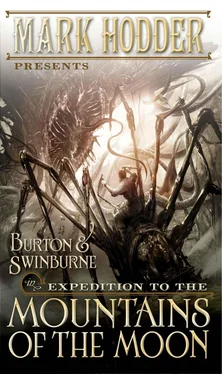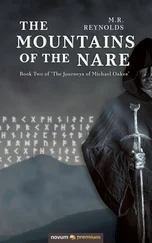Mark Hodder - Expedition to the Mountains of the Moon
Здесь есть возможность читать онлайн «Mark Hodder - Expedition to the Mountains of the Moon» весь текст электронной книги совершенно бесплатно (целиком полную версию без сокращений). В некоторых случаях можно слушать аудио, скачать через торрент в формате fb2 и присутствует краткое содержание. Жанр: sf_stimpank, на английском языке. Описание произведения, (предисловие) а так же отзывы посетителей доступны на портале библиотеки ЛибКат.
- Название:Expedition to the Mountains of the Moon
- Автор:
- Жанр:
- Год:неизвестен
- ISBN:нет данных
- Рейтинг книги:5 / 5. Голосов: 1
-
Избранное:Добавить в избранное
- Отзывы:
-
Ваша оценка:
- 100
- 1
- 2
- 3
- 4
- 5
Expedition to the Mountains of the Moon: краткое содержание, описание и аннотация
Предлагаем к чтению аннотацию, описание, краткое содержание или предисловие (зависит от того, что написал сам автор книги «Expedition to the Mountains of the Moon»). Если вы не нашли необходимую информацию о книге — напишите в комментариях, мы постараемся отыскать её.
Expedition to the Mountains of the Moon — читать онлайн бесплатно полную книгу (весь текст) целиком
Ниже представлен текст книги, разбитый по страницам. Система сохранения места последней прочитанной страницы, позволяет с удобством читать онлайн бесплатно книгу «Expedition to the Mountains of the Moon», без необходимости каждый раз заново искать на чём Вы остановились. Поставьте закладку, и сможете в любой момент перейти на страницу, на которой закончили чтение.
Интервал:
Закладка:
Speke nodded and glanced at the other man. There was a disturbing lifelessness to Burton's voice, as if a large part of him had simply switched off.
The next afternoon, after mindlessly slogging over hill after hill, they caught sight of the great lake, stretching all the way to the horizon.
In a voice still devoid of emotion, Burton said, “I apologise, John. Had I seen this with my own eyes during our initial expedition, I would never have doubted your claims.”
“It was my fault you didn't see it,” Speke answered. “I became obsessed with the idea that my name alone should be forever associated with the solving of the Nile problem.”
“The diamond influenced your judgement as soon as we were within range of it.”
“Perhaps. Do you think we'll make it home?”
Burton looked down at himself. His tick-infested 1918 army fatigues were torn and rotting. His boots were cracked.
“I have reason to believe we will.”
“And what then?”
Burton shook his head and shrugged.
Just before sunrise, they set out again. For a short time, Burton walked, then his legs gave way and he collapsed onto the litter. He drifted in and out of consciousness. Fever raged through him like a forest fire.
Sometimes he opened his eyes and there was blue sky; other times, the Milky Way. On one occasion, he rolled his head to the right and saw a mirror-smooth expanse of water covered by thousands of pelicans.
For a long time, he saw nothing.
A hand shook his shoulder.
“Isabel,” he muttered.
“Dick! Wake up! Wake up!”
He opened his eyes and looked upon John Speke's lined, heavily bearded features, and his own reflected in the other's black, brass-ringed left-eye lens. He pushed himself up and found that a little strength had returned to him.
“What is it?”
“Listen!”
Burton looked around. They were on a slope. It concealed the landscape ahead and to the right, but on the left jungled hills rolled away before climbing to faraway mountains.
In front, from beyond the crest of the incline, mist was clouding into the sky.
A constant roar filled his ears.
“That sounds like-”
“Falling water!” Speke enthused. “Can you walk?”
“Yes.”
The lieutenant took Burton's arm and helped him to his feet. With a gesture to the Chwezi and Wanyambo warriors, he indicated that they should stay put.
The two Britishers walked slowly toward the summit, Burton leaning heavily on his companion. The sun burned their faces. Mosquitoes darted around them. The air was heavy and humid.
They reached the top.
Below them, the earth was cut by a wide and deep rift into which, from the edge of the Ukerewe, a great mass of water hurtled. Thundering beneath billowing vapour, it crashed and splashed and frothed over rounded rocks, and cascaded through the arch of a permanent rainbow. Fish leaped from it, flashing in the sunlight, and birds darted in and out of the rolling cloud.
There could be no doubt.
It was the source of the River Nile.
Burton thought: Here it begins. Here it ends. Not the source, but just another part of a circle.
They stood silently for a long while, deafened by the sound of the falling water, then Speke roused himself, leaned close to Burton, put his mouth to the explorer's ear, and shouted: “We've done it, Dick! We've discovered it at last!” He clutched his companion's elbow. “And we did it together!”
Burton tore himself away and Speke took a step back, shocked by the ferocious expression on the other man's face.
“You can have it! I want nothing more to do with it! It's yours, Speke! The whole damned thing is yours!”
Over the next few days, they followed the river north, struggled across an extensive quagmire, pushed through thickets of water hyacinth, and found themselves on the shore of a second lake, smaller and much shallower than the Ukerewe. It was completely covered with water lilies and smelled of rotting vegetation.
“What shall we name it?” Speke asked.
“Why name it at all?” Burton growled. “It is what it is. A bloody lake.”
The lieutenant shook his head despairingly and walked away. He couldn't understand the other's mood at all. Burton had hardly spoken since their discovery of the falls. He wasn't even bothering to acquire the Chwezi language, which was entirely out of character, for in Speke's experience Burton was driven by a mania to conquer every foreign tongue he encountered.
The Wanyambo warriors, now far from home and unwilling to go any farther, left them.
Over the next three days, the Chwezi guided the two Britishers around the southern shores of the lake to where, at its western tip, the river flowed out of it.
They followed the waterway. The land was boggy and swarming with snakes. Foul-smelling gasses bubbled out of the ground.
The sun rose and set and rose and set, and they lost count of the days. Mosquitoes bit every inch of their exposed skin. Their clothes fell to pieces and had to be replaced with cotton robes, donated by villagers. They wound rough cloth around their now bootless feet and walked with staffs, looking like a couple of heavily bearded skeletons, burned almost black, too exhausted to communicate, or even to think.
One of their guides, who'd been scouting ahead, returned and spoke quietly to his companions. He approached Burton and Speke and jabbed his finger first at one, then at the other, then toward a ridge that lay just to the south of the river, a couple of miles to the west.
He rejoined the other Chwezi and, as a man, they disappeared into the undergrowth.
Suddenly, the Britishers were alone.
“Well then,” Speke said, shading his one functioning eye and peering at the nearby high land. “I suppose we're meant to go up there.”
They set off through sucking mud and shouldered past stiff bullrushes until the terrain sloped upward, became firmer underfoot, and they climbed to the top of the ridge. On the other side of it, the Nile flowed into another vast lake, and on the near shore, just half a mile away, an air vessel was hovering about forty feet from the ground. It was a gargantuan cigar-shaped balloon with a long cabin affixed beneath it and pylons, with rotor wings at their ends, extending out horizontally from its sides. The ship, which must have been close to a thousand feet in length, was painted with a Union Jack and bore on its side the name HMA Dauntless.
A large camp of Rowtie tents lay in the shadow of the vessel.
Burton suddenly spoke: “John, I have to make a request of you.”
“What is it?”
“Tell them nothing. Not now, and not when we return to London. Don't let on anything of what we've experienced here. The future may depend on it.”
“Dick, I-”
“I need your word on it.”
“Very well. You have it.”
Burton took Speke's hand and shook it.
They stumbled down toward the camp and had crossed half the distance when they were spotted. A shout went up, men started running toward them, came close, and gathered around. One of them stepped forward.
“By James!” he exclaimed. “Is that you, Sir Richard?”
Burton's vision was swimming. The man in front of him blurred in and out of focus. Slowly, recognition dawned.
“Hello,” the king's agent whispered. “I'm very happy to see that you've recovered from your injuries, Captain Lawless.”
Everything toppled over and darkness rushed in.
CHAPTER 13
“We are each our own devil, and we make this world our hell.”
— Oscar WildeWhile Sir Richard Francis Burton was in Africa, electricity came to London. Now, in early 1864, thick cables were clinging to the walls of the city's buildings, looping and drooping over its streets, dripping in the fog, and quietly sizzling as they conveyed energy from Battersea Power Station across the nation's capital.
Читать дальшеИнтервал:
Закладка:
Похожие книги на «Expedition to the Mountains of the Moon»
Представляем Вашему вниманию похожие книги на «Expedition to the Mountains of the Moon» списком для выбора. Мы отобрали схожую по названию и смыслу литературу в надежде предоставить читателям больше вариантов отыскать новые, интересные, ещё непрочитанные произведения.
Обсуждение, отзывы о книге «Expedition to the Mountains of the Moon» и просто собственные мнения читателей. Оставьте ваши комментарии, напишите, что Вы думаете о произведении, его смысле или главных героях. Укажите что конкретно понравилось, а что нет, и почему Вы так считаете.












